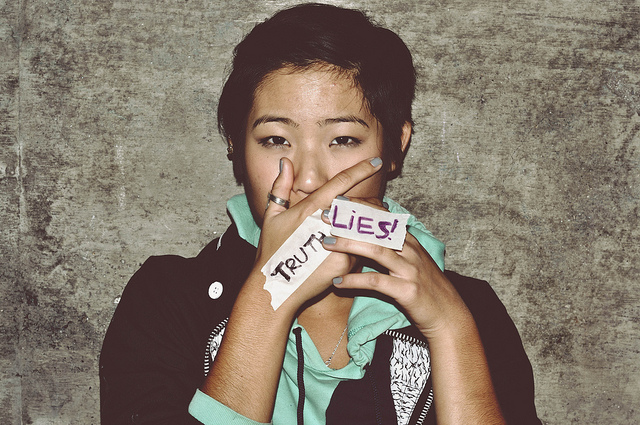
It has become increasingly obvious to me how profoundly valuable honest communication is in relationships.
Articulate speech is the missing link in modern human connection, as far as I can see.
If we lack the capacity to speak our truth—unable to convey our deepest feelings—then how can we possibly see eye-to-eye with those we care about most?
Frankly, I don’t believe we can even get along with someone without speaking our truth—but I’ll explain that later.
There is a growing ideology among millennials to profess truth as a kind of illusion—an entirely deceptive and misleading idea made up by some old patriarchs to keep us in line.
This is a disaster.
If we deny the existence of some kind of truth, neglecting the value of its pursuit, honest communication and articulated speech are impossible. There would be nothing honest or truthful to articulate.
This is a deeply nihilistic and cynical point of view, one that paints a hyper-Darwinian picture of reality where all of human existence is just a conglomeration of various pathologies clamoring to get to the top of the pyramid scheme. Any proclivity toward self-understanding or deeper knowledge is seen as weakness or merely an expression of a person’s privilege.
Look: I get it.
I understand how one could look out at the world and see nothing but treachery and insanity, but the way to mend it is not through copying those manners of being. I mean, come on, man! Isn’t that obvious?
Rather, I believe we can change the world through speaking our truth, through expressing as clearly as possible what is happening, and this starts in our own circles.
I made a video recently entitled, “Friendships End When We Stop Negotiating,” where I discuss the necessity for honest communication through the immense complication and peculiarity of human relationships.
Never has there been a place where honest speech is more important than in intimate relationships.
Bit of advice: If your partner is unwilling or unable to converse about what is happening in the relationship—then it’s over.
We are all far too strange not to explain where we are coming from.
We are too complicated to leave things unsaid.
When conversation ends, connection dies.
If we are unable to be honest with each other and negotiate our problems, then there is nothing left. It’s done.
So what does it actually mean to speak our truth?
Well, perhaps I’ll begin to answer this question with a personal story.
I’ve had a severe chronic illness over the past few years—one that is unimaginably debilitating and painful—the recovery of which is by no means certain.
That’s pretty bad, but let’s take it a step further. I look relatively healthy. I have no symptoms that are obvious to other people, nor do I have any implicit way of conveying that I am a sick person.
On top of the symptoms and sheer frustration of being physically impaired, there is a separation between myself and others, being that there is nothing self-evident about my illness. Because of this, every interaction I have with a new person starts from a point of profound misunderstanding.
Through this experience, I’ve had to learn to speak my truth—how to express this insane situation to other people. Part of that has been done through writing.
Speaking our truth implies expressing the deeper elements of who and what we are, and doing so in a way that resonates with other people.
Returning to the opposing view here, if there was no such thing as truth, how could things resonate with other people? How could I explain something and have someone immediately understand where I was coming from without having the same experience themselves?
If we are telling the truth, and the person we are speaking to genuinely wants to understand us, we will be heard.
That’s that.
The desire for understanding must be mutual to maintain a connection, and speaking our truth is the bridge over this gap.
So, how do we learn to speak our truth?
Writing out our thoughts may be one of the best tools to articulate ourselves. Before I got into writing, I journaled whenever I found the time. There is something liberating about getting our ideas and feelings down on paper—and this seems to be a clear indicator of our essential nature in some way.
This is where I may go a bit “woo-woo,” but stay with me.
There is an unadulterated and dynamic field of infinite consciousness resting below the waking mind, and most human endeavors are meant to manifest this underlying consciousness. To become a high-level creator is to find a modality that best accesses this latent domain of our human potential.
Writing and speaking are crucial to the unveiling of this potential because they are the most coherent forms of expression we have (being that they concern language more than any other art form).
Whether we are a painter, a business person, or a sculptor, this ability to articulate our deeper nature and clearly express the fundamental aspects of our being is absolutely essential to our development as human beings, but also our development as a culture.
Let’s speak our truth.
Relephant:
~
~
~
Author: Samuel Kronen
Image: Jintae Kim/Flickr
Editor: Danielle Beutell
Copy Editor: Leah Sugerman
Social Editor: Yoli R








Read 1 comment and reply